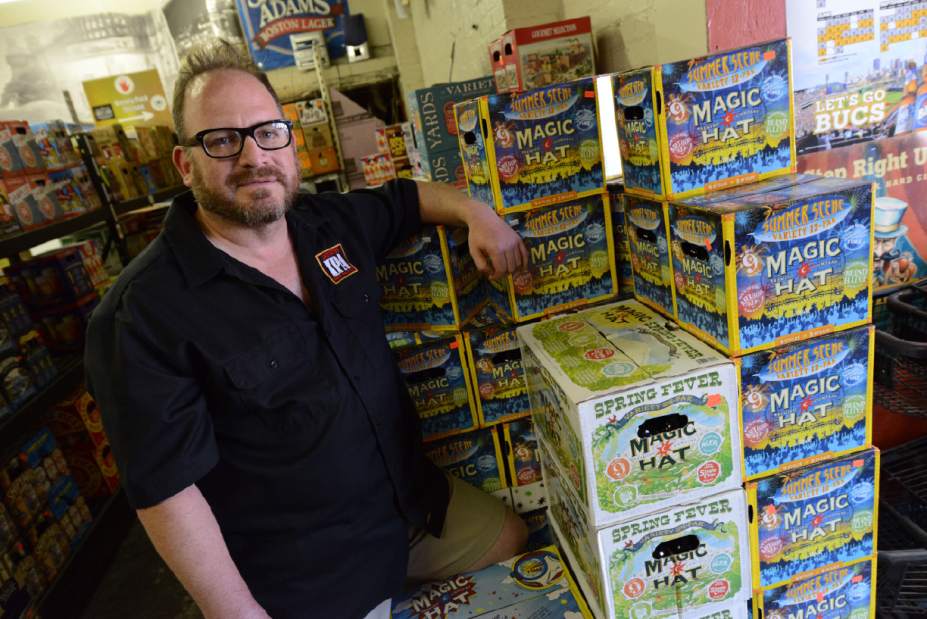https://archive.triblive.com/news/pennsylvania/12-pack-beer-sales-met-with-jeers-cheers-in-western-pa/
12-pack beer sales met with jeers, cheers in Western Pa.

Sidney Davis | Trib Total Media
Frank Pistella says sales of 12-packs now exceed those of cases at his beer distributorship in Pittsburgh's Friendship neighborhood,
Just eight weeks since Pennsylvania began allowing beer distributors to sell 12-packs, Frank Pistella is surprised by the ways that sales have changed at his store in Pittsburgh.
Pistella, whose family has owned Pistella Beer Distributors in Friendship for 32 years, sells more 12-packs than cases. Overall sales are up, too, although he did not have specific figures.
“There's a dynamic shift in what is selling. Everything you knew last year at this time is now wrong,” said Pistella, vice president of the state's Malt Beverage Distributors Association.
Others in the industry — mainly brewers — worry that the change occurred too fast. For many small breweries, making 12-packs in-house can slow production and require installation of equipment that costs at least $200,000, said William J. Covaleski, president of Brewers of Pennsylvania and owner of Victory Brewing Co. in Chester County.
“We operated under the same rules for 82 years. All of a sudden, overnight, it changes with an advisory opinion. We have supported this. We wanted it done legislatively,”
The Pennsylvania Liquor Control Board approved the change in March, a reversal of Prohibition-era requirements that distributors sell beer by the case or keg.
Brewers of Pennsylvania has 187 members. Covaleski estimates that about two-thirds of them only sell their products in Pennsylvania and are at a disadvantage because they package beer in cases of 24.
“It is a worry for Pennsylvania. It is a big investment in equipment. A tremendous advantage has been handed to out-of-state breweries,” Covaleski said.
Dave Casinelli, chief operating officer at D.G. Yuengling & Son Inc. in Pottsville, estimates as few as 10 percent of Pennsylvania craft beer manufacturers have equipment to make 12-packs.
Yuengling, which bills itself as the country's oldest brewer, has made 12-packs for many years because it sells them in other states.
Before March, Covaleski sold 12-packs and six-packs outside of Pennsylvania. But he had to get an outside company to package them, increasing his costs.
Some beer distributors have embraced selling 12-packs while others have not, Casinelli said.
“I have not seen any figures. It's way too early. In casual interaction, I've seen some distributors embrace the change. Others not as much,” he said.
Hillcrest Beer Distributing in Lower Burrell, which carries about 30 brands, does not sell 12-packs, although it might later, Sean Robertson, warehouse manager, said.
“A case is a better buy — 12-packs are always more expensive, per beer,” he said.
Diana Bellisario, owner of Mellinger's Beer Distributor in Oakland for 24 years, says 12-packs have boosted sales sharply, especially of popular craft beers that have added 12-packs.
“It is growing and growing, sales here. People buy a case and add on another beer in a 12-pack,” Bellisario said.
Beer sales were up half a percent to $101.5 billion in the United States in 2014 over the previous year, according to the Brewers Association, a national trade group. Sales of craft beers grew 17 percent.
Such changing taste helps Bellisario compete against growing sales of beer in Pennsylvania supermarkets.
“We can now compete against Giant Eagle. We just couldn't before. People come back when they know what we have,” she said.
In the end, the change may not matter that much, said Pistella, who said there are limits to how much beer people will buy no matter how it's packaged.
“People thought Sunday sales would add to overall sales. They really have not. It spread the same amount of sales over seven days,” he said.
Rick Wills is a staff writer for Trib Total Media.
Copyright ©2025— Trib Total Media, LLC (TribLIVE.com)
